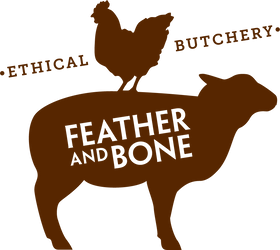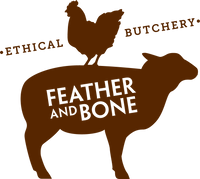Principles and guidelines
Whole pasture-raised animals
We source whole, pasture-raised livestock directly from farms committed to genuinely sustainable soil, plant and animal health. The animals live all or the majority of their lives outside, ranging freely in family groups on sustainably-managed pastures.
Soil fertility
The farmers practice regenerative agriculture and use various natural systems for achieving optimum soil fertility, including rotational grazing and fostering plant diversity. They don’t use chemical growth promotants, pesticides, fertilisers, herbicides or prophylactic antibiotics.
Certification and rare breeds
About 70% of the farms are certified bio-dynamic, organic or Humane Choice Free Range. Those that aren’t certified conform to organic principles and meet the requirements listed below. We give preference to farms growing heritage or rare breeds of livestock. Different breeds suit different climates, environments and palettes.
Also, the science shows that biodiversity in every area of life - below and above the soil, even in our gut microbiome - is the key to health and vitality.
Process and dry ageing
The bodies arrive whole at our factory where we cut and pack to order. We’re committed to the traditional practice of dry ageing prime cuts (particularly beef) for up to seven weeks. We think the result is incomparable to meat that hasn’t been allowed to rest and settle in carefully controlled conditions.
Transparency and respect
We visit all the farms we work with to understand the unique characteristics and practices of each producer. Everything we sell is attributed so you can trace exactly where it comes from and every claim we make can be substantiated either by us, the producer or the certifying body. NO GREENWASHING or vague motherhood statements about sustainability here!
We write regularly about the producers and issues affecting transparency in the food system and work hard to give our customers the information they need to make informed choices.
Footprint
Butchery is a high-energy input business - lots of refrigeration, transport, water and packaging use. We do our best to mitigate against our carbon-emitting impact. We've installed solar panels at our production facility and source a significant portion of our grid energy from renewable sources. We've converted our hot water to solar. Where possible, we use compostable plastic bags and vegetable-based paper wrapping and our delivery boxes are recycled cardboard lined with recycled, compostable woollen liners for insulation.
This is how we show our respect for the animal, the producer and you.
OUR GUIDELINES
These are unchanged since we started in 2006. We do our best to offer as much information as we can about the production, treatment, transport and preparation of our produce.
- We started in 2006 with an aim of supplying exceptional produce sourced directly from producers throughout New South Wales, and occasionally beyond.
- We don’t buy from third parties and we guarantee the provenance of all produce sold under our name.
- We seek out, and give preference to, producers working with rare and endangered breeds of livestock, with specific attention to rare breeds of pigs, cattle, sheep and poultry.
- All animals sold by us have been raised predominantly outside, which doesn’t mean simply having ‘access’ to the sun, fresh air and water, but in a situation where the animal is substantially free to express instinctive behaviours.
- No product carried by us has been administered growth promotants at any point in its life. Antibiotics are used sparingly, if at all, and are not part of the routine diet of any animal we source.
- Similarly, with pasture management, chemical fertilisers are used sparingly, if at all, and strong preference is given to producers utilising various natural systems for promoting plant diversity and improving soil health and fertility.
- We only source whole animals that arrive entire, neither boxed nor packed in plastic. Note that if the producer themselves also breaks and butchers their own produce we may then buy the parts they have for sale.
- We don’t carry the products of feed-lots. Occasionally it may be desirable or even necessary to use grain as part of a ruminant’s diet but no cow, sheep or goat sourced by us is the product of a continuous grain-fed regime. 'Past
- Every attempt is made by our producers to practice low stress stock handling throughout the growth cycle and at slaughter. Occasionally errant abattoir and/or transport practices can undermine the best practice of the producers and this will be reflected in the quality of the meat. We strive to minimise this through close liaison with transport and processing facilities.
- We dry-age our meat on the bone for between 1 and 8 weeks. For delivery purposes use is made of loose bags or vacuum packaging but extended storage in plastic is always avoided.
- We endeavour to make all the processes involved in the breeding, rearing, slaughter and delivery of our products as transparent as possible. Enquiries regarding any and all aspects of production are welcome as are visits to our production facility.



